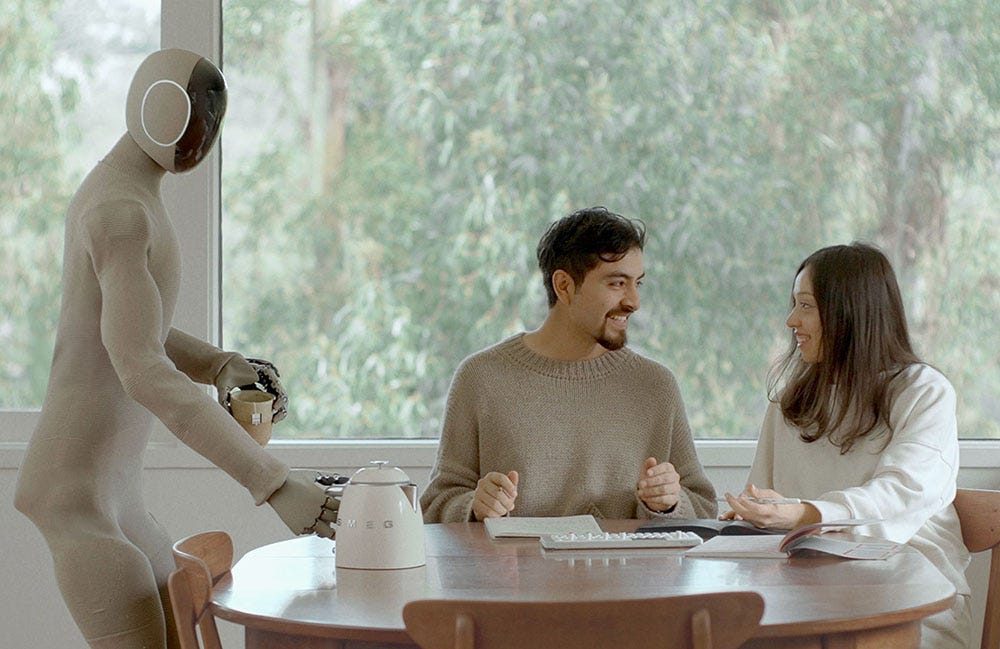They Will Move Among Us
The humanoid robot at home
Welcome to this update from New World Same Humans, a newsletter on trends, technology, and society by David Mattin.
If you’re reading this and haven’t yet subscribed, join 28,000+ curious souls on a journey to build a better future 🚀🔮
It’s the Easter holidays and my sons, Jacob and Leo, are at home for two weeks.
As always during the school holidays, here in my house we’ve fallen into a little interregnum. Time at my desk has been balanced against other imperatives: trips to the park to play cricket, feedback on various Minecraft builds, and general attempts at the psycho-social cultivation of two 11-year-old boys.
Meanwhile, my 81-year-old mother is currently staying with us. Her house was flooded; water poured through the ceiling from her bathroom and drenched the electrics. It turns out that the roots of an old ivy plant, which grows on the side of her house, have collapsed an outside drain.
In other words, domestic matters have prevailed. And time has been limited. So just a quick thought this week; one that also orbits around matters domestic. Mainly, it’s a chance to (i) point you in the direction of a worthwhile newspaper article, and (ii) re-up an essay I wrote back in 2021, which deals with issues that are becoming only more urgent.
So, that newspaper piece.
My eye was caught by a (paywalled) New York Times piece about humanoid robots. The article focused on the Norwegian startup 1X, which says it will soon put its Neo humanoid on trial inside 100 homes in Silicon Valley.
Most humanoid startups are targeting workplaces; see Agility Robotics, whose Digit device is still on trial inside Amazon fulfilment centres.
But 1X is chasing an adjacent dream: the universal household-helper robot. The humanoid that can serve you afternoon tea, load the dishwasher, and take the dog for a walk.
There’s much in the piece that’s fascinating, but I was particularly struck by the apparent pace of development inside 1X. The writer recounts how he visited the 1X office around a year ago to view their earlier humanoid, Eve, which moved around on wheels and couldn’t do much. Six months later he returned to find the newly-minted Neo, which could walk on two legs and navigate around him when he got in the way.
Now, Neo has been taught how to perform a wide range of everyday tasks; 1X last month showcased this progress in a new video:
The takeaway? We’re accelerating towards a breakthrough moment for humanoids.
Way back in 2021, I wrote a piece about the arrival of humanoids into our homes called Our Coming Robot Utopia. The NYT piece prompted me to go back to it. Happily, I found that I still agree with most of what I said.
Part of me can’t wait for a household helper robot that will sweep my kitchen floor, and bring me cups of tea while I write.
But I can’t help wondering what we’ll find ourselves giving up in return for these conveniences. And how the work we outsource to humanoids will move beyond these kinds of lifestyle tasks, and towards other kinds of work. Especially the work of caring for — of really being present for — one another.
It is rightly considered bad taste to quote yourself in writing. But I’m going to give myself permission just this one. This is what I had to say back in 2021:
…as everyday robots approach, we should ask ourselves a series of questions. What do we want them to do for us? What don’t we want them to do? What should we do with the time they will save us? And how come the work we seem most determined to outsource to them is that associated with each other; often with our own relatives? What does that say about the technology companies who want to build these devices? What does it say about us, the intended users?
There questions, I think, remain to be answered.
And with that, I hear my sons becoming antsy. I think another trip to the park is beckoning.
Until next week, be well,
David.
This was #13 in the series Postcards from the New World, from NWSH.


I still have to agree with Astro Teller of Google Moonshots' X on humanoid robots:
https://www.youtube.com/watch?v=f6lQ8GfMGe4&t=2544s
The "humanoid" design constraint is largely artiface for VCs/investors who work off of old sci-fi for validation. It's a sad imagination fail.
They'll get better coupled with AI. No one seemed upset with "smart" tech homes. After all, your phone app can scan what's in your fridge so you don't buy extra milk, turn on the coffee maker at the precise time and temperature, and even get your 30 minute workout without tracking the time.
Here's where it gets interesting, no: At what point will humans decide to be human again?🤔